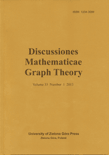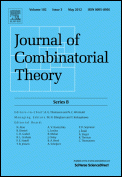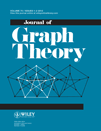
Transactions on Combinatorics
Scope & Guideline
Unlocking the Potential of Discrete Mathematics
Introduction
Aims and Scopes
- Graph Theory:
A significant portion of the journal's content revolves around graph theory, exploring properties, structures, and applications of various types of graphs including trees, digraphs, and hypergraphs. - Combinatorial Optimization:
The journal features research on combinatorial optimization problems, including algorithms and techniques for solving complex problems in efficient ways. - Spectral Graph Theory:
There is a consistent focus on spectral graph theory, analyzing the eigenvalues and spectral properties of graphs and their implications in various domains. - Combinatorial Enumeration:
The journal publishes papers that address counting problems, bijections, and enumeration techniques that are central to combinatorial mathematics. - Applications in Other Fields:
Research that bridges combinatorics with other disciplines, such as computer science, chemistry, and network theory, is also highlighted, showcasing the interdisciplinary nature of combinatorial research.
Trending and Emerging
- Distance Spectral Analysis:
There is a growing interest in the distance spectral properties of graphs, particularly regarding their applications in network theory and optimization problems. - Domination and Independence in Graphs:
Research on various domination and independence concepts in graphs is trending, reflecting an increasing need for understanding these properties in practical applications such as network security and resource allocation. - Energy and Spectral Indices:
The exploration of energy and spectral indices in graphs is gaining traction, highlighting their relevance in chemistry and physics, particularly in modeling molecular structures. - Algorithmic Combinatorics:
The rise of algorithmic approaches to combinatorial problems is evident, with an emphasis on developing new heuristics and algorithms for solving complex combinatorial optimization issues. - Hypergraph Theory:
Emerging interest in hypergraphs and their properties indicates a shift towards more complex combinatorial structures, reflecting their applicability in various fields such as computer science and biology.
Declining or Waning
- Classical Combinatorial Designs:
There has been a noticeable decrease in papers focusing on classical combinatorial designs, such as block designs and finite geometries, possibly due to a shift towards more applied or computational approaches. - Elementary Combinatorial Techniques:
The publication of papers solely based on elementary combinatorial techniques has waned, suggesting a trend towards more advanced and sophisticated methodologies in combinatorial research. - Graph Colorings and Matchings:
Research specifically on traditional graph colorings and matchings is less frequent, indicating a potential shift towards more complex graph structures and their properties. - Static Combinatorial Structures:
Studies focusing purely on static combinatorial structures without considering dynamic or algorithmic perspectives appear to be declining, reflecting a broader interest in dynamic systems and applications.
Similar Journals

DISCRETE APPLIED MATHEMATICS
Exploring Innovative Solutions in Applied Mathematics.DISCRETE APPLIED MATHEMATICS, published by ELSEVIER, is a premier journal dedicated to advancing the fields of Applied Mathematics, particularly focusing on Discrete Mathematics and Combinatorics. Since its inception in 1979, the journal has established itself as a vital resource for researchers and practitioners alike, achieving a commendable Q2 ranking in both applied and discrete mathematics categories as of 2023. With an ISSN of 0166-218X and an E-ISSN of 1872-6771, the journal serves an international audience by disseminating significant findings and fostering innovation in mathematical applications. Its Scopus ranking positions it notably within the top tier, ranking #23 out of 92 in Discrete Mathematics and Combinatorics, highlighting its impact in the academic community. Although the journal is not open access, it remains accessible through institutional subscriptions. Researchers, professionals, and students are encouraged to engage with the relevant and rigorous research published in this esteemed journal, as it plays a crucial role in shaping the future of mathematical sciences.

Journal of Integer Sequences
Innovative Insights: Connecting Researchers in Integer SequencesJournal of Integer Sequences, published by University of Waterloo, stands as a vital resource within the field of Discrete Mathematics and Combinatorics. This open-access journal, which has been in circulation since 1998, is dedicated to the study and dissemination of research concerning integer sequences, a fundamental aspect in various mathematical disciplines. With a current impact factor reflected by its Q3 ranking in the 2023 category of Discrete Mathematics and Combinatorics, the journal enhances its visibility through a dedicated approach to scholarly excellence and engagement with cutting-edge research. Positioned in Canada, the journal encourages contributions from researchers, professionals, and students alike, fostering a collaborative environment where innovative mathematical ideas can flourish. Explore the depths of integer sequences and their applications by accessing this journal for vital insights and advancements in the field.

Discussiones Mathematicae Graph Theory
Connecting Researchers Through Graph Theory InsightsDiscussiones Mathematicae Graph Theory is a prestigious peer-reviewed journal published by UNIV ZIELONA GORA, specializing in the dynamic fields of Graph Theory, Discrete Mathematics, and Applied Mathematics. With an ISSN of 1234-3099 and an E-ISSN of 2083-5892, this Open Access journal has been providing unrestricted access to its content since 2013, promoting widespread dissemination and engagement in academic research. Established in 2009 and continuing its influential publication through 2024, Discussiones Mathematicae Graph Theory is committed to fostering collaborations and innovations among researchers, professionals, and students alike. Its impressive category quartiles for 2023 show it ranks within the Q3 range for both Applied Mathematics and Discrete Mathematics and Combinatorics, as well as good positions within the Scopus rankings, ensuring its critical relevance in the mathematical community. By continuously highlighting groundbreaking research in graph theory, this journal stands as a vital resource for anyone looking to advance their knowledge and contribute to the evolving landscape of mathematics.

Annals of Combinatorics
Advancing Knowledge in Combinatorics and BeyondAnnals of Combinatorics, published by Springer Basel AG, serves as a premier platform for innovation and research in the field of discrete mathematics and combinatorics. With an ISSN of 0218-0006 and an E-ISSN of 0219-3094, the journal captures the ongoing developments and breakthroughs that characterize this dynamic discipline, which plays a crucial role in various applications such as computer science, optimization, and statistical mechanics. The journal has been recognized as part of the Q2 category in the 2023 rankings for discrete mathematics and combinatorics, reflecting its significant contribution to the academic community. Researchers and educators alike benefit from its insightful articles that not only cover theoretical advancements but also practical implications. With convergence years spanning from 2005 to 2024, the Annals of Combinatorics continues to be an essential resource for anyone looking to deepen their understanding and explore new frontiers in combinatorial research.

Journal of Combinatorial Algebra
Elevating Research Standards in Algebra and CombinatoricsThe Journal of Combinatorial Algebra, published by the European Mathematical Society (EMS), is a pioneering open-access journal dedicated to advancing research in the fields of Algebra and Number Theory, as well as Discrete Mathematics and Combinatorics. Since its inception in 2018, the journal has been committed to promoting high-quality, rigorous research, evidenced by its 2023 scopus rankings placing it in the second quartile across both disciplines. It serves as a vital platform for academics, researchers, and students to share innovative findings, methodologies, and theoretical advancements within combinatorial algebra, facilitating collaboration and knowledge dissemination in the mathematical community. With its open access policy adopted in 2021, the journal ensures that its content is freely available to a global audience, further enriching the landscape of mathematical research. The journal's editorial board, composed of leading experts, guarantees the integrity and academic excellence of published articles, making it an essential resource for those engaged in the dynamic fields of combinatorics and algebra.

JOURNAL OF ALGEBRAIC COMBINATORICS
Connecting global experts in the pursuit of mathematical excellence.JOURNAL OF ALGEBRAIC COMBINATORICS, published by SPRINGER, stands as a premier resource in the fields of algebra and combinatorics, playing a pivotal role in advancing research in these disciplines. With an esteemed impact factor reflective of its academic rigor, it holds a prestigious Q1 ranking in both Algebra and Number Theory, as well as in Discrete Mathematics and Combinatorics, according to 2023 assessments. Established in 1992, this journal features contributions from leading experts worldwide, offering insights into the latest developments and methodologies. Although not an open-access journal, it provides a wealth of valuable information and research findings focusing on combinatorial structures, theory, and applications that are essential for advancing academic inquiry. As a vital publication for researchers, professionals, and students alike, JOURNAL OF ALGEBRAIC COMBINATORICS continues to shape the conversation within the mathematical community and beyond, making it indispensable for those engaged in the dynamic landscape of mathematical sciences.

Aequationes Mathematicae
Pioneering Research in the Heart of Mathematical Innovation.Aequationes Mathematicae is a distinguished academic journal published by SPRINGER BASEL AG, focusing on the dynamic fields of Applied Mathematics, Discrete Mathematics, and Combinatorics. Since its inception in 1968, the journal has served as a vital platform for disseminating high-quality research, with Converged Years expected to extend to 2024. With an impressive Q2 ranking in multiple mathematical disciplines as of 2023, Aequationes Mathematicae is positioned within the top half of its field, reflecting its reputation for excellence. Spanning the globe from its base in Basel, Switzerland, this journal is ideal for researchers, professionals, and students seeking to advance their knowledge and contribute to ongoing discussions within mathematics. While it does not currently offer Open Access options, readers can still access an extensive archive of impactful studies that bolster its standing within the academic community.

JOURNAL OF COMBINATORIAL THEORY SERIES B
Connecting Scholars Through Cutting-edge ResearchJOURNAL OF COMBINATORIAL THEORY SERIES B, published by Academic Press Inc., Elsevier Science, is an esteemed journal within the discipline of combinatorial theory, discrete mathematics, and theoretical computer science. With a rich history since its inception in 1971 and ongoing publication through 2025, this journal has established itself as a pillar in its field, currently holding Q1 category rankings in multiple areas including Computational Theory and Mathematics, Discrete Mathematics and Combinatorics, and Theoretical Computer Science. The journal features cutting-edge research and developments, attracting contributions from both established professionals and emerging scholars. Despite the absence of an open access option, the journal's strong impact reflected in its Scopus ranks—such as being number 16 out of 92 in Discrete Mathematics and Combinatorics (83rd percentile)—signifies its influential role in advancing knowledge and innovation. Researchers seeking to share impactful findings and connect with a vibrant academic community will find the JOURNAL OF COMBINATORIAL THEORY SERIES B an essential resource.

JOURNAL OF GRAPH THEORY
Exploring the Intersections of Mathematics and InnovationJOURNAL OF GRAPH THEORY, published by WILEY, stands as a pivotal resource in the fields of Discrete Mathematics and Combinatorics, as well as Geometry and Topology. Since its inception in 1977, this esteemed journal has fostered the dissemination of influential research, currently categorized in the prestigious Q1 quartile according to the latest metrics for 2023. With an ISSN of 0364-9024 and an E-ISSN of 1097-0118, it caters to a global readership of researchers, professionals, and students dedicated to advancing their knowledge in graph theory. By maintaining a strong rank in Scopus—39th out of 106 in Geometry and Topology, and 38th out of 92 in Discrete Mathematics and Combinatorics—it reflects its significance and impact within the academic community. Although it does not offer open-access options, its rigorous peer-review process ensures that only high-quality original research is published, thus reinforcing its reputation as a leading journal in this mathematical domain.

Australasian Journal of Combinatorics
Pioneering Research in the World of CombinatoricsThe Australasian Journal of Combinatorics, published by the CENTRE DISCRETE MATHEMATICS & COMPUTING, serves as a vital platform for researchers and professionals engaged in the dynamic field of discrete mathematics and combinatorics. With an ISSN of 2202-3518 and an E-ISSN of the same, this journal has been committed to open access since 2014, ensuring that groundbreaking research is readily available to a global audience. Based in Australia, specifically at the Department of Mathematics, University of Queensland, this journal spans the years from 1996 to 2024, showcasing the evolution of combinatorial research over nearly three decades. Recognized in the 2023 category quartiles as Q3 in Discrete Mathematics and Combinatorics, it ranks 68th out of 92 in Scopus, reflecting its growing influence despite its current percentile of 26th. The Australasian Journal of Combinatorics is dedicated to fostering innovative research and theoretical development, making it a valuable resource for academics and students alike.